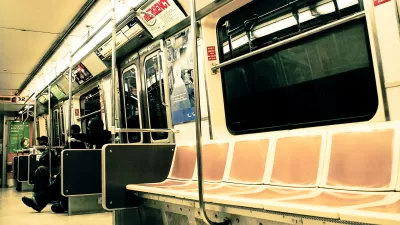Unlike the public transit systems of many other cities, Rochester, New York, recently lowered its fares -- and they've got a budget surplus to boot. But to maintain this economic rarity, service has been reduced.
"At a time when public transportation systems around the country are struggling with soaring fuel costs and pinched budgets, the bus system in Rochester has done something that few others would contemplate: This month, it lowered its single-ride fare.
Rochester's Regional Transit Service is no behemoth. It carries 15 million riders a year, as many as the New York City transit system carries in two days. But as economic hard times have reduced tax revenues and increased demand for government transit subsidies, its experiences may provide valuable lessons for larger cities that are planning fare increases, like New York, Minneapolis and Cleveland.
The Rochester system, which expects to run a surplus for the third year in a row, has been able to reduce its one-ride fare in part by eliminating some low-trafficked routes, avoiding debt and aggressively raising revenues from other sources. The fare fell to $1 from $1.25 on Sept. 1."
FULL STORY: Creativity Helps Rochester’s Transit System Turn a Profit

Manufactured Crisis: Losing the Nation’s Largest Source of Unsubsidized Affordable Housing
Manufactured housing communities have long been an affordable housing option for millions of people living in the U.S., but that affordability is disappearing rapidly. How did we get here?

Americans May Be Stuck — But Why?
Americans are moving a lot less than they once did, and that is a problem. While Yoni Applebaum, in his highly-publicized article Stuck, gets the reasons badly wrong, it's still important to ask: why are we moving so much less than before?

Research Shows More Roads = More Driving
A national study shows, once again, that increasing road supply induces additional vehicle travel, particularly over the long run.

Judge Halts Enforcement of Anti-Homeless Laws in Grants Pass
The Oregon city will be barred from enforcing two ordinances that prosecute unhoused residents until it increases capacity and accessibility at designated camping sites.

Advancing Sustainability in Los Angeles County Schools
The Los Angeles County Office of Education’s Green Schools Symposium brings together educators, students, and experts to advance sustainability in schools through innovative design, climate resilience strategies, and collaborative learning.

Using Old Oil and Gas Wells for Green Energy Storage
Penn State researchers have found that repurposing abandoned oil and gas wells for geothermal-assisted compressed-air energy storage can boost efficiency, reduce environmental risks, and support clean energy and job transitions.
Urban Design for Planners 1: Software Tools
This six-course series explores essential urban design concepts using open source software and equips planners with the tools they need to participate fully in the urban design process.
Planning for Universal Design
Learn the tools for implementing Universal Design in planning regulations.
City of Moreno Valley
Institute for Housing and Urban Development Studies (IHS)
City of Grandview
Harvard GSD Executive Education
NYU Wagner Graduate School of Public Service
City of Cambridge, Maryland
Newport County Development Council: Connect Greater Newport




























